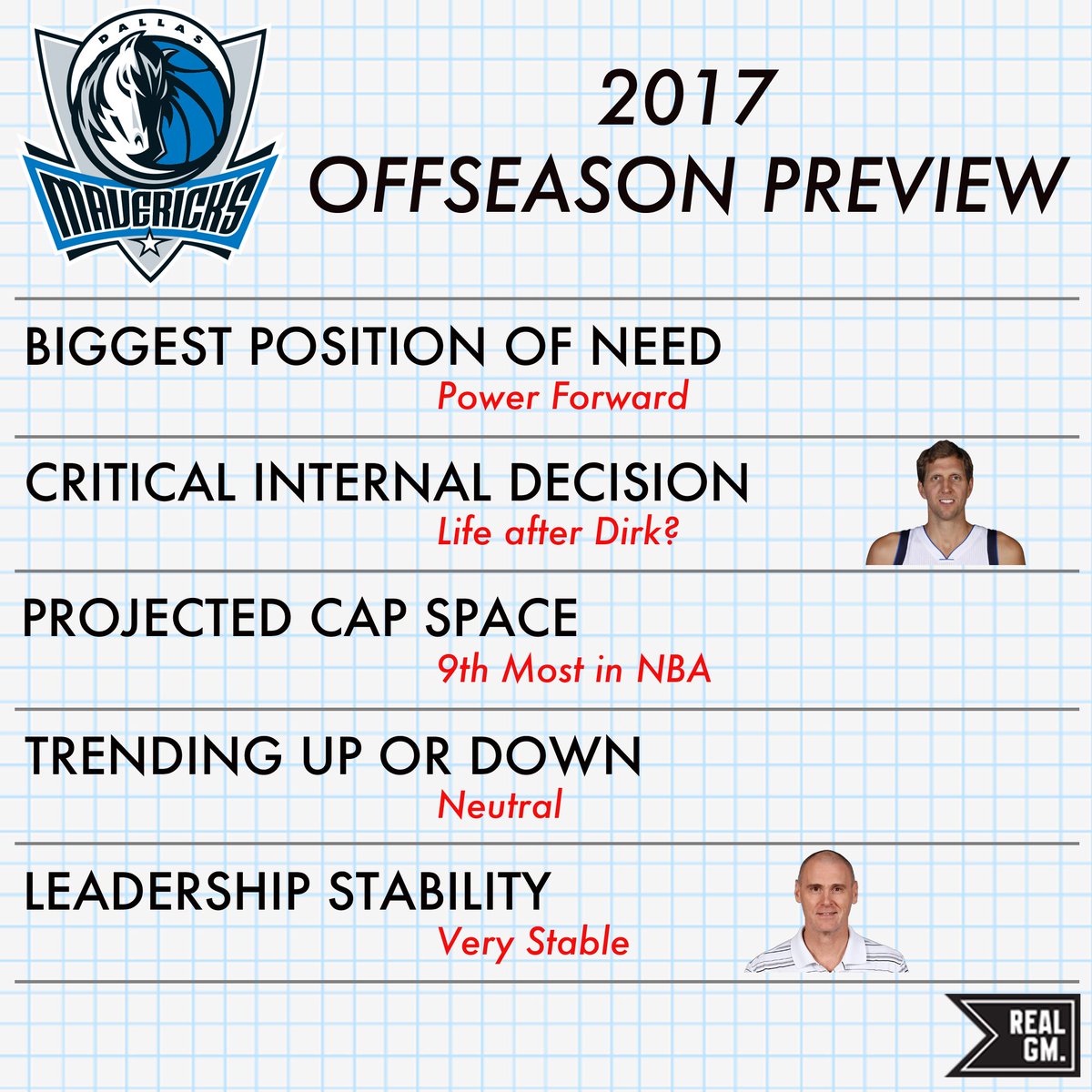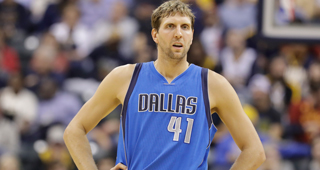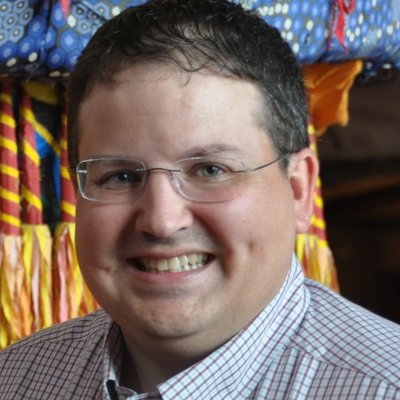The Dallas Mavericks are coming off their first losing season since the millennium turned over. It was also just the second time in the last 17 years that Dallas watched the playoffs from home. Normally this might signal that it is time to start the rebuilding process, but the Mavericks quietly started down that path a year ago, while also remaining committed to being competitive for as long as Dirk Nowitzki is still playing.
Facing their first period of real roster flux in years, the Mavs re-made their roster around Nowitzki. Mark Cuban has repeatedly stated that while he knows it is probably best for the team to tank, he won’t do that while Nowitzki is still with the franchise. That meant Dallas tried an on-the-fly rebuild, and while it might not have worked out great for the 2017 season, it has the team set up well for the future.
With a lot of cap space, the Mavericks signed Harrison Barnes in free agency. With a need for a scoring small forward, Dallas made Barnes their number one priority. He’s the player they are going to build around whenever Nowitzki retires. In his first season as a primary scoring option, Barnes acquitted himself well with a career-best 19.2 points per game.
Dallas also picked up Andrew Bogut from the Warriors in a salary dump when Golden State was clearing space to sign Kevin Durant. Bogut was injured for most of the year and had little impact for the Mavericks.
In addition, the Mavericks added Seth Curry, after the Kings non-tendered him and allowed him to become an unrestricted free agent. Curry had a breakout season for the Mavs, scoring over 12 points per game and shooting over 42 percent from behind the arc.
Dallas then re-signed a trio of veterans in Nowitzki, Deron Williams and Dwight Powell. Nowitzki continues to sign team-friendly contracts that give the Mavs flexibility. He’s in full partnership mode with Dallas at this point and just wants the best team possible as he plays out the final years of his career.
Williams was re-signed to a one-year deal and was solid for Dallas. He was waived once it became clear the Mavericks weren’t making the playoffs. The Mavs also did him a solid by waiving him, versus trading him at the deadline, as it allowed him to pick his own destination. This type of arrangement curries favor with players and agents and could help Dallas down the line.
Powell, who was acquired in the Rajon Rondo trade the previous year, was given a deal that raised some eyebrows around the NBA. Considering his age, and the contracts others got around the league at the power forward/center positions, Powell was a reasonable signing.
Where Dallas did some of their best work was with undrafted free agents. They picked up Dorian Finney-Smith, who became a rotation player and one of the team’s best wing defenders, and Nicolas Brussino, who showed some flashes late in the year.
In season, the roster tinkering continued. The team cycled through several players on 10 Day Contracts, and found a keeper in Yogi Ferrell. Ferrell played well for Dallas after a call-up from the D-League, and earned a two-year deal. Dallas also added Jarrod Uthoff from the D-League and claimed DeAndre Liggins late in the year. Both are good training camp guys for 2017 camp that could make the roster if things fall their way.
The Mavs' big move, and one that has as much to do about the future as it did in 2017, was the acquisition of Nerlens Noel from the 76ers at the trade deadline. Dallas traded Bogut and Justin Anderson, as well as what will be two second round picks, for Noel. He was in and out of the lineup in Dallas, but showed enough that the Mavericks likely have this season’s big signing already on the roster.
Flipping forward to this summer, Noel is the first question that needs answered. He’s a restricted free agent and the Mavericks will look to retain him on a new deal. Another team could force their hand by tendering Noel an offer sheet, but that seems unlikely. Look for Dallas to lock him up to a deal that starts around $20 million or so per season, and he’ll be their center for the foreseeable future.
The Mavs hold a team option for Yogi Ferrell at the one year veteran minimum, and considering his production, they’ll exercise that and bring him back. Liggins is a bit of a question mark, but he’s likely to have his team option picked up as well, at which point his contract becomes only partially guaranteed.
Nowitzki is the team’s other free agent. Dallas will probably decline his team option and then renounce him. That will free up cap space for other signings. Nowitzki will then re-sign for whatever is left, after the Mavs make their other additions. This is now fairly standard operating procedure for Nowitzki and Dallas, and it affords the Mavs incredible flexibility.
Dallas has several positions filled going forward. They have Nowitzki (for at least one more year before retirement), Barnes, Noel, and Powell up front. They have point guard options all over the roster from Curry to Devin Harris to J.J. Barea to Ferrell. The wing spot has Wesley Matthews and Finney-Smith.
Because they have quality depth, if lacking top-end talent, the Mavericks can afford to be selective this summer. Dallas could still use some players who can create their own offense. With several players able to play up a position, the Mavs also have flexibility position-wise as well.
Power forward seems to be the most glaring hole, as Barnes is best as a small forward who can play up at power forward at times, Noel is best at center and Nowitzki is going to retire eventually. Dallas could maneuver to get enough cap space to throw a big offer at veteran like Paul Millsap or Serge Ibaka. Or they could go the lesser route and pursue a player like Taj Gibson or Greg Monroe, if the latter opts out in Milwaukee. Dallas would also be an interesting landing spot for Kelly Olynyk as an eventual replacement for Nowitzki.
On the wing, Dallas likes versatile players and could make things interesting on the restricted front by putting together large offer sheets for Bojan Bogdanovic, Shabazz Muhammad, Andre Roberson, Joe Ingles or Tony Snell. They’re probably out of the running for the top tier restricted free agents like Kentavious Caldwell-Pope, Otto Porter or Tim Hardaway Jr., because getting to the amount of cap space to make them a large enough offer would be tricky.
If Dallas wants another option for the backcourt, Shaun Livingston would be a quality addition. He’s big enough to defend 1-3 and would add some experience to the roster. A shooter like Jodie Meeks would help as well. And Rick Carlisle has done great work with veteran point guards and rehabbing their value, so player like Derrick Rose or Brandon Jennings would be interesting if they came cheap enough.
Because Cuban won’t fully rebuild until Nowitzki retires, it puts the Mavericks in a tricky spot. They want to be competitive, but can’t hamstring the roster long-term because Nowitzki is very much on a year-to-year basis at this point. That means Dallas is likely target younger players, but ones who are ready to compete right now. And then they’ll supplement around them with veterans on one or two year deals, potentially overpaying to do so. It is a precarious way to live, but one that the Mavs will live with until Dirk hangs ‘em up.
Offseason Details
Guaranteed Contracts (6): J.J. Barea, Harrison Barnes, Seth Curry, A.J. Hammons, Wesley Matthews, Dwight Powell
Partial/Non-Guaranteed Contracts (5): Nicolas Brussino, Dorian Finney-Smith, Devin Harris, Salah Mejri, Jarrod Uthoff
Potential Free Agents (4): Yogi Ferrell (RFA – Team Option), DeAndre Liggins (UFA – Team Option), Nerlens Noel (RFA), Dirk Nowitzki (UFA – Team Option)
“Dead” Money on Cap (1): $315,758 (Gal Mekel)
First Round Draft Pick(s) (pre-Lottery): Pick #8
Maximum Cap Space: $36,206,664
Projected Cap Space: $15,558,909




